McCaul, King Release Report on National Network of Fusion Centers
|
Washington, D.C. – July 26, 2013 – Today, U.S. House Homeland Security Committee Chairman Michael McCaul (R-Texas) and Homeland Security Subcommittee on Counterterrorism and Intelligence Chairman Peter King (R-NY) released a Majority Staff Report entitled “The National Network of Fusion Centers,” detailing the Committee’s findings and recommendations developed from a comprehensive study of fusions centers across the country.The National Network of Fusion Centers (Network) was developed in the wake of the 9/11 terrorist attacks to close the gaps in information sharing between Federal, State and local law enforcement and emergency responders. Currently, the Network includes 78 fusion centers across 49 states, three territories and the District of Columbia.Fusion centers serve as hubs of strategic analysis and information sharing where Federal, State, and local agencies are all represented in one location. State and local crime data is coordinated, gathered and reviewed to determine if there is any potential connection to terrorist activity. In addition, Federal terrorism-related information is shared with State and local law enforcement. The Committee’s review concludes that the Network is not functioning as cohesively as it should be and fusion centers are facing numerous challenges that prevent the Network from realizing its full potential to help secure the homeland. Over the course of nineteen months, the Committee logged 147 meeting hours during visits to 32 fusion centers, in addition to briefings and discussions with Federal partners and the National Fusion Center Association. The full report is available HERE. Chairman McCaul: “Fusion centers were created after 9/11 to correct the failure of information sharing between federal agencies and state and local law enforcement. While much progress has been made, breakdowns in information sharing continue today and the terrorist attacks at Ford Hood and the Boston Marathon are painful examples. The Committee’s evaluation found that while the Network of fusion centers is a vital part of our Nation’s counterterrorism efforts, it is not currently functioning at its full potential. “For example, while it is more important than ever for Federal fusion center partners to work together to increase information sharing with state and local law enforcement, the FBI is actually removing analysts and information sharing tools from them. This and other important issues are examined in the Report in an effort to identify ways to improve our counterterrorism efforts. The goal of this report is to aid fusion centers in filling in their capability gaps. I urge them, and their federal, state and local partners to implement the report’s recommendations to ensure the Network reaches its full potential to help secure the homeland.” Subcommittee Chairman King: “Nearly 12 years after the 9/11 terrorist attacks, the tragic events in Boston highlight that more work needs to be done to connect the dots. Ensuring critical information sharing between Federal, State and local law enforcement is vital for national counterterrorism and homeland security efforts. This comprehensive report offers 25 recommendations to improve information sharing and analysis, enhance the role of fusion centers, ensure that emergency response providers are fully incorporated into the process, and tear down remaining intelligence stovepipes. My Subcommittee will continue to work with Federal, State, and local entities to ensure that these issues are addressed.” The report makes 25 recommendations of actions to be taken by fusion centers, States, DHS, FBI and DOD in the following areas: Comprehensive Strategies & Measures of Success: The Network needs a comprehensive State and locally-driven National Strategy for Fusion Centers, in addition to a Federal Strategy for Fusion Centers to steer Federal coordination and support for the Network. Performance metrics should be developed and used as part of these strategies to guide State grant expenditures and Federal resource allocation. Funding: Once a National Strategy is formed, DHS should engage in thorough discussion with stakeholders to determine whether the Federal government should more directly fund fusion centers and review other grant and funding models to determine if a different model would be more effective. Fusion Center Analysis: To enhance the coordination, identification and analysis of information, fusion centers should consider creating National Mission Analysis Units, increasing Suspicious Activity Reporting trend analysis, and enhancing Critical Infrastructure and Key Resources programs. In addition, in a State with multiple fusion centers one center should be responsible for the integration of analysis from across all fusion centers within the State. Outreach: Fusion centers should work to increase partnerships with entities outside of the law enforcement community, such as the fire, emergency medical services, and public health sectors. In addition, fusion centers and federal partners should work together to strengthen Terrorism Liaison Officers programs. Access to Information & Systems: There is a disparity in security clearances granted to State and locals from DHS and the FBI. Federal partners should take steps to equalize security clearances to foster increased information sharing. Federal partners play a vital role in ensuring the unified operation of the Network and the report makes particular recommendations to DHS’s Office of Intelligence and Analysis (I&A) and the FBI. Specifically, the report recommends that the FBI make a more concerted effort to ensure its field office are held accountable for robust cooperation and information sharing with fusion centers and State and local law enforcement. This effort should include more stringent oversight of information sharing occurring between its field offices and the fusion centers. In addition, the report recommendations that I&A work with Congressional oversight committees to address challenges to the analytic production approval process and the Intelligence Officer and Reports Officer programs. Furthermore, I&A should conduct reviews of the structuring of the Office of Analysis and the management of field officers to ensure analysts and field officers are is being effectively deployed.
|

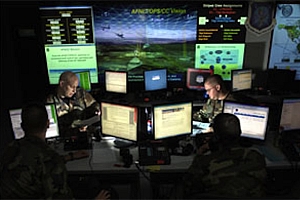



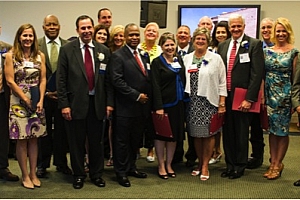
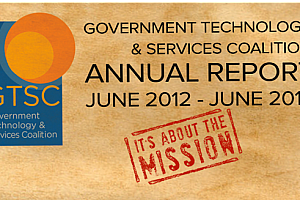
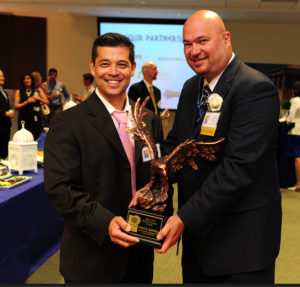
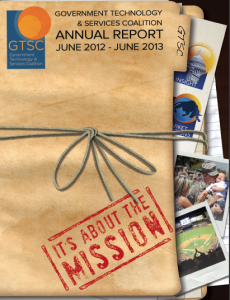

 About Commander Richardson
About Commander Richardson

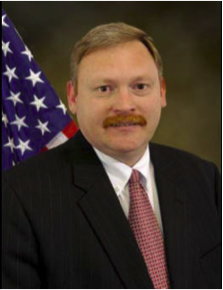 Kevin Boshears, Director, Office of Small and Disadvantaged Business Utilization, U.S. Department of Homeland Security
Kevin Boshears, Director, Office of Small and Disadvantaged Business Utilization, U.S. Department of Homeland Security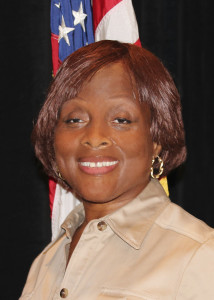 Peggy Butler-Mason, Deputy Director, Subcontracting and Mentor Protege Program Manager, U.S. Army, Office of Small Business Programs, Office of the Secretary of the Army
Peggy Butler-Mason, Deputy Director, Subcontracting and Mentor Protege Program Manager, U.S. Army, Office of Small Business Programs, Office of the Secretary of the Army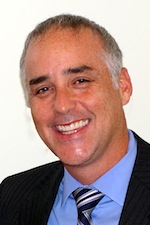 Wayne Pizer, Vice President, Small Business Programs,
Wayne Pizer, Vice President, Small Business Programs,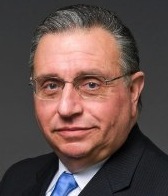 Tony Sacco, Vice President, SAIC
Tony Sacco, Vice President, SAIC

